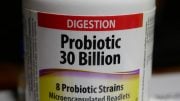
From humans to animals, probiotics are having a moment. The microbiome is a hot topic and for good reason — it can affect your immune system, brain function, and digestive health. And when you have a dog in your home, you have the added worry of ensuring that there is a proper balance of bacteria in all that fur.
While pet probiotics aren’t as popular as their human counterparts, you can still find a wealth of probiotics made for dogs. Surprisingly, around one in four dogs is taking a probiotic, according to Explodingtopics.com. But does your dog need one?
What Are Probiotics?
Probiotics are living organisms (microorganisms) that, when given in adequate amounts, confer a health benefit on the host. Probiotics may be bacteria or yeasts. The term “probiotic” comes from the Greek words pro and biota, which means “for life.”
In humans and animals, probiotics are abundant in the gastrointestinal tract, skin, and vagina. They are sometimes referred to as ‘friendly bacteria’ because they help maintain a healthy balance of microorganisms in the gut when ingested. They also help with nutrient absorption and gut health. Plus, there’s also evidence that the composition of the gut ecosystem may play a role in immune health and weight control.
Humans and animals can get probiotics from certain foods, like fermented foods, or by taking a probiotic supplement. Commercial dog foods don’t contain probiotics or prebiotics, fermentable fiber that feeds probiotic bacteria and helps them flourish. So, dogs don’t get many of these friendly bacteria if they eat a diet of commercial dog food.
Does Your Dog Need Probiotic?
Research suggests probiotics may benefit dogs with certain health conditions. According to Cornell College of Veterinary Medicine, probiotics may be helpful for dogs with conditions such as:
- Irritable bowel syndrome
- Other digestive issues
- Poor coat quality
- Bad breath
- Skin disorders
- Urinary tract infections
- Obesity
- Allergies
The question is whether dogs can benefit from a probiotic supplement for the maintenance of a healthier gut microbiome or for prevention of health issues. Since 70% or more of a dog’s immune system (and a human’s immune system) is in their gut, probiotics could be beneficial for maintaining immune and digestive balance. It’s unclear at this point whether probiotics can prevent health problems in dogs.
Veterinarians also point out that giving a probiotic to a dog during stressful times, such as boarding, may be of benefit since stress can cause disruptions in the gut microbiome and gut health. Also, probiotics during antibiotic therapy may reduce the incidence of diarrhea, a common side effect of antibiotics. Talk to your dog’s veterinarian first though.
Some Concerns about Dog Probiotics
One concern about the available dog probiotics is whether the bacteria survive in high enough quantities during storage to be of benefit. If you give your dog a probiotic, research first and buy one from a reputable company that tests the quality of their products. Veterinarians recommend a dog get between 1 and 10 billion colony-forming units (CFUs) per day.
Some companies that make dog probiotics take an extra step and microencapsulate their probiotic bacteria to increase their survivability. If you buy a probiotic supplement, don’t stock up. The longer you store the product, the greater the loss of viable probiotic bacteria. In one study that looked at 26 probiotic products, only 2 had the amount of probiotic bacteria listed on the label.
What about Dietary Sources Probiotics?
Another way to optimize a dog’s gut microbiome is to give them fermented foods that contain active probiotic bacteria. You have a variety to choose from including yogurt, kefir, and fermented vegetables, such as fresh sauerkraut. A tablespoonful of one of these foods in your dog’s food will help seed their gut with probiotic bacteria that they don’t get from commercial dog foods. It’s best to introduce these foods slowly into your dog’s diet since adding fermented foods too quickly to their diet can cause diarrhea and stomach upset.
The Bottom Line
Dogs that eat commercial dog foods can easily suffer from constipation, diarrhea and other bowel problems and these foods don’t contain probiotics for gut health. Your dog may benefit from a probiotic, especially if they have digestive issues, but choose their probiotic wisely to ensure it contains viable organisms. Giving your dog fermented foods daily is another way to support their gut microbiome and digestive health.
References:
- ExplodingTopics.com. “Dog Probiotics”
- “Prebiotics and Probiotics for Dogs and Cats – Today’s ….” todaysveterinarynurse.com/articles/prebiotics-and-probiotics-for-dogs-and-cats/.
- “Clinical effect of probiotics in prevention or treatment of gastrointestinal disease in dogs: A systematic review” by Anders P. Jensen and Charlotte R. Bjørnvad, 16 July 2019, Journal of Veterinary Internal Medicine.
DOI: 10.1111/jvim.15554 - “Understanding the canine intestinal microbiota and its modification by pro-, pre- and synbiotics – what is the evidence?” by Silke Schmitz and Jan Suchodolski, 11 January 2016, Veterinary Medicine and Science.
DOI: 10.1002/vms3.17 - The power of probiotics. Cornell University College of Veterinary Medicine. Published July 8, 2021. Accessed March 1, 2022. vet.cornell.edu/departments-centers-and-institutes/canine-health-center/health-info/power-probiotics









My dog gets probiotics… In her yogurt, good for mind & body… Not necessary then to “buy” all the 💰💵 grabbing gimmicks n tricks…